I Locked Down On A Deserted Thai Island: Coronavirus In Thailand
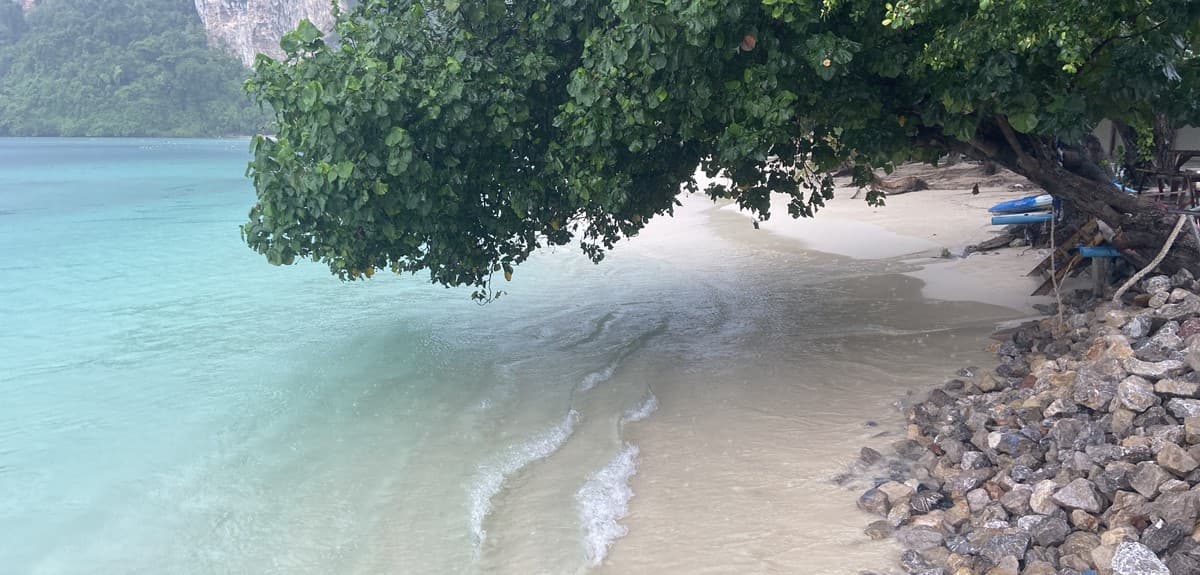

I had been travelling across Thailand in February and was coming to the end of a month-long trip.
Little did I know, my vacation was about to be extended for another three months as the entire world entered lock-down.
Thailand was the first country asides from China to have cases of the coronavirus. Back in early January, the first case was reported and I had been following the story since then. There was some changes seen early on, more people wearing face-masks, for example, and less Chinese tourist around.
But never did I expect what was about to happen, I don't think anyone was.
Find Out More About When Thailand Will Reopen Borders To Tourism After The Coronavirus
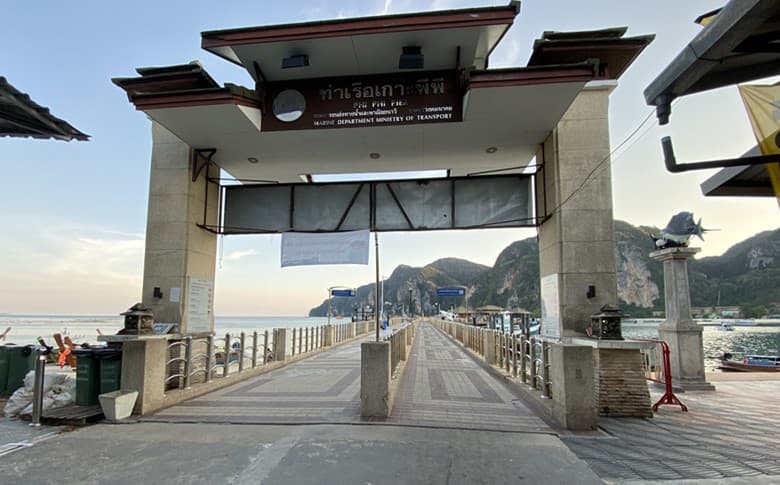
I chose to quarantine on what is usually one of Thailand's busiest islands, that now remains deserted. On a normal day, the island would welcome ten thousand tourists plus another six thousand residents- on the last consensus, there were just a few hundred people left on the island.
It is something I'd never seen before, something I'd never imagined, something I didn't think was possible.
I'd never have expected Thailand, a country that relies on tourism so heavily to even ban international arrivals. I never thought I'd find myself in Thailand's most controversial tourism hot spot, without tourists. But that is the situation we are in, and that's where I've ended up.
I watched each morning as more and more people left the island. Tourist numbers dwindled down to zero, a few ex-pats and some locals remained. Anyone who chose to stay knew that the island would soon be sealed off and disconnected from the outside world.
Separated from civilisation and from the rest of the world. It was like I'd been handed the keys to Disney World. I had some of the worlds most lusted-after beaches to myself, and it was glorious.
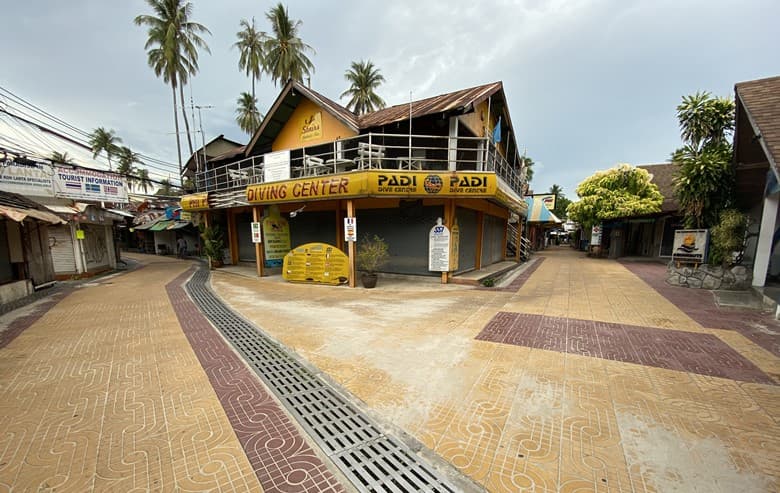
I watched as the once hectic harbour became deserted. Ferries ceased operations, arrivals were prohibited and the island was sealed off to outsiders. Swimming pools were drained, hotels boarded up, ATM's switched off, street lighting powered down, 7-11's closed, bars, restaurants and markets left abandoned. Boats which normally line the beaches were gone and those who chose to stay were alone, in our own unique lockdown.
It didn't take long for Mother Nature to begin overtaking beaches and oceans and it didn't take long for the island's nature to start bouncing back into life.
In normal times before the coronavirus, tourism on Thailands islands was a controversial topic among travellers. People love to hate it. "It isn't a paradise island" "There are too many tourists", people will claim. I'd usually agree, until I saw the island without tourists, that it. Without tourists, the novelty wears off and the island loses a part of its character and soul, it's beautiful, yes. But also boring. It isn't what the place is about.
Here's the tale of how I lived on one Thailand's most beautiful islands during the coronavirus lockdown.
Check out the latest updates on borders reopening to tourists, here.
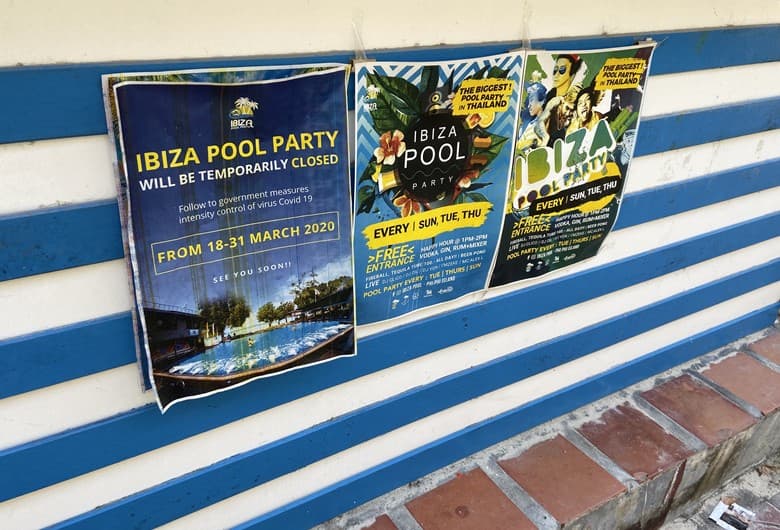
If I was going to stay in Thailand any longer, I was going to need a visa. With China on lock-down and other south-east Asian countries following suit, I knew it was only a matter of time until Thailands international borders would too be closing. I had to act fast.
I booked a return ticket for the next day. A flight from Phuket into Kuala Lumpur in the morning and back again in the afternoon. I was a little worried about becoming stranded in Malaysia rather than Thailand, but I had no choice, I had to risk it and I had to fly during a global pandemic.
March the 17th I'd booked my flight, March 18th I would be flying. That was until the latest news broke. "A religious gathering in Kuala Lumpur is attributed to over 500 new coronavirus cases, Malaysia has closed their borders to all foreigners."SHIT.
Air Asia have still refuse to reschedule my ticket.
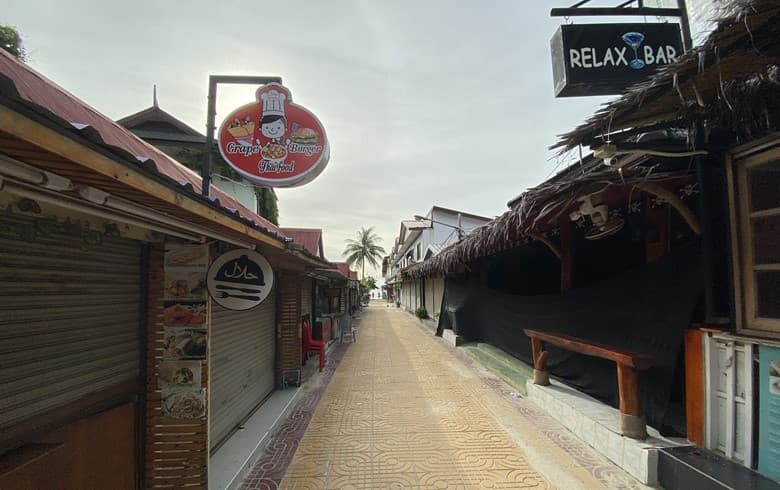
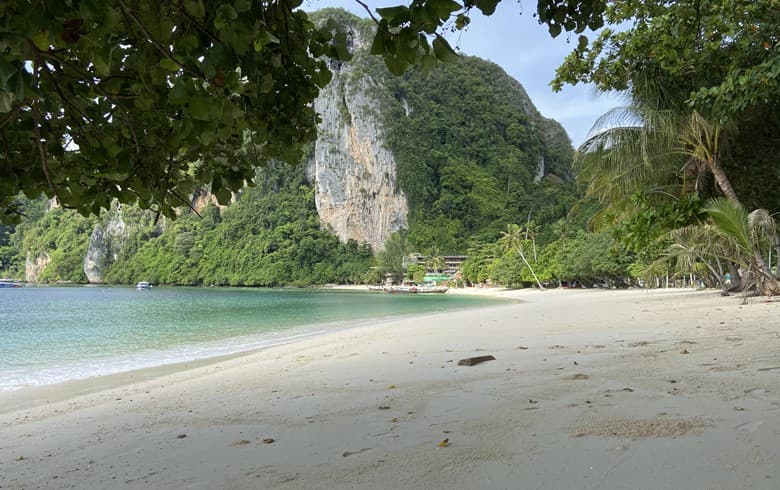
I started looking at other options. I needed a quick, safe way to leave and return to Thailand, It was clear, air travel wasn't going to be an option.
I decided a bus ticket was a safer bet. And quickly got on the phone to local bus companies to weigh up my options.
Laos has closed all international and land borders, I was told by one operator, Cambodia isn't allowing tourists to enter another company told me. Panicking, I managed to find the news I wanted. There was a bus going to Myanmar on the same day.
"I'm in" I told them. "How much does it cost? You know what, I don't care, just pick me up at this address".
The bus, (and boat) were heading to another Island. "The Andaman Club", the island is technically in Burmese waters, but it's basically a huge offshore casino set up to avoid Thailand's strict gambling laws. That was perfect for me, it meant I could get a new visa and *technically* I didn't have to leave Thailand. No risk of getting stranded in Myanmar. Although, I did lose a couple of hundred dollars in the casino, what a mug.
I rode on the last boat back into Thailand and borders closed behind me. I had 30-days on my visa, I wasn't sure how long this whole coronavirus in Thailand ordeal would last- but for now, I had what I wanted.
Thankfully a few weeks later, the Thai Immigration announced that visa immunity would be given until September.
Here's an update on the current visa situation regarding the coronavirus.
It was fantastic news. But September was almost six months out. That was one of the first indications this might not blow over as quickly as I'd thought it would.
I rode the bus back from the Burmese border, and stayed that night in Phuket.
The was the last day of normality. Bangla Road was putting up a fight in a bid to prove that it was a clean and safe place to be, (it wasn't). They had enlisted the help of the local fire department and jet washed the street. In what was set to be the last night that entertainment venues would open.
It was trending on social media, and I wanted to check the place out for myself. I was shocked with what I saw.
The coronavirus had sucked the life and soul from Phuket, rendering Thailand busiest strip a ghost town. It was a shame, but it started to sink in how real this situation was. Travel was cancelled. I found a quiet guesthouse, stayed the night and rode the speedboat over to the island where I planned to quarantine in the morning. I wanted to get there before provincial travel restrictions were in place, and no one had any idea what was going to be enforced, and when. I didn't want to hang around for too long.
There were just three people on the speedboat, me, the captain and his assistant. I was their only paying passenger. The service was cancelled after that. In fact, all boat operators soon followed suit.
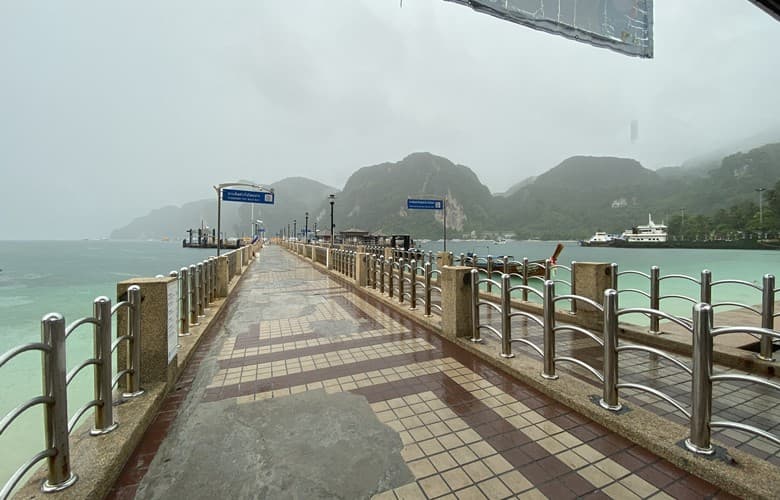
In the early days, arrivals to the Island were screened for coronavirus. A check point was set up on the pier, funded by the islands state funded hospital. It was marketed as a safe place to be. With only one point of entry onto the island it was easy to check each and every arrival.
But within a matter of days, domestic travel began grinding to a halt. People soon became aware that the tourism season was over and the island would soon seal itself off from the mainland- anyone who wanted out would have to leave quickly.
Locals working on the island left for their home towns. There was no work for anyone, 99% of business on the island are tourism focused. Even hospitals pulled down the shutters and closed. The few who chose to stay knew they'd become stuck for an indefinite period of time.
It was a strange sight, walking past the lifeless pier. Not a single boat was docked. On a typical day, it would be frustrating, three or more boats coming and going every hour and people packed in like sardines. But not any longer.
Find Out More About When Thailand Will Reopen Borders To Tourism After The Coronavirus
Coronavirus lock-downs began in Thailand with the introduction of a curfew. From 10 PM until 4 AM people were ordered to stay at home. The exact times that the island is usually buzzing with life.
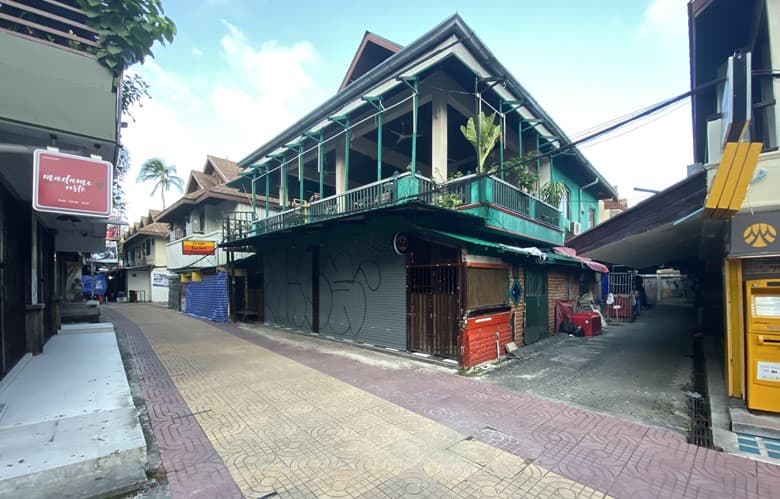
All entertainment venues closed and the atmosphere changed dramatically. I've seen the island without nightlife once before, after the sad passing of the King a few years ago. But even then, restaurants were open and people were able to buy beers to drink on the beaches. This time it was different, the island was eerily quiet.
I used to be able to freely roam the country but not anymore. I was confined to the island, there was no way to leave until the coronavirus in Thailand had blown over. I'd found myself thirsty one night. I had forgotten to stock up on water, and there was nothing I could do until sunrise. Pharmacists were closed, small shops closed and even 7-11's.
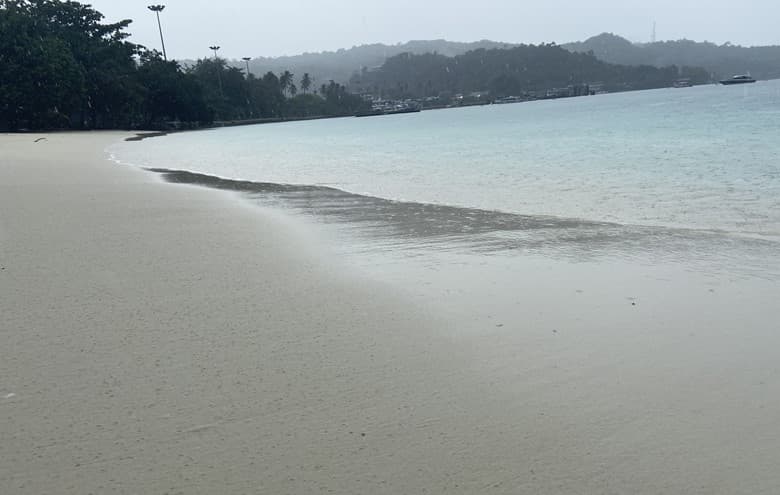
This regulation wasn't heavily enforced, and it wasn't enforced for long. There were so few people on the island that the rules enforced themselves. There was nothing to do in the evenings, there was no reason to go out anyway. It started feeling late after sunset, at seven o'clock, a time when bars would usually start to fill with tourists.
Beaches would usually be illuminated with floodlights but not anymore. The power was cut. The same went for the street lighting and after sundown, the island was plunged into darkness.
Regulations set out by the Thai government didn't apply so much here, everyone on the island had a mutual agreement, a pact not be dick's to each other- and it worked. Curfews weren't enforced at all after the first couple of days. And even if the police did decide to arrest you for breaking curfew, the jailhouse is on the mainland and there are no ferries to take you there.
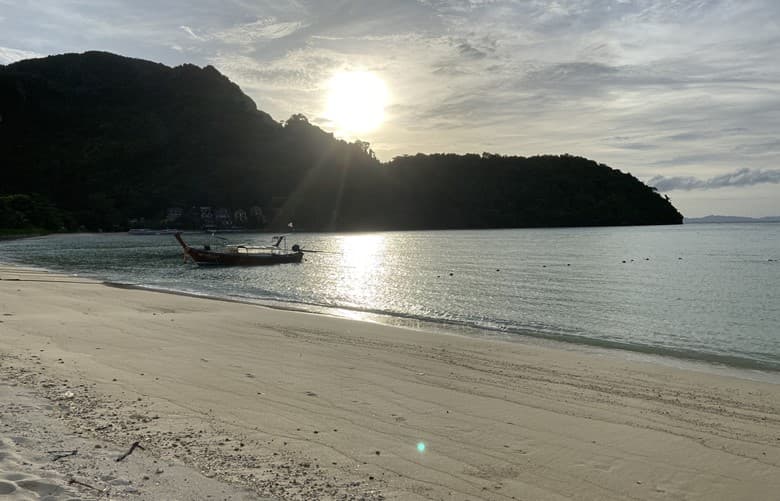
For anyone who has visited the island, you'll understand why 'social distancing' is a difficult prospect. The streets are barely two meters wide. But there were so few tourists around anyway that I doubt it made much difference.
We weren't free to leave the island, but we were free to roam. We were never ordered to stay at home and the beaches were never closed. Things were handled differently here. People wanted life to stay as 'normal' as possible.
To ensure freedom every single person on the island was checked for signs of the coronavirus and interviewed to learn about their travel history. There were no cases of the virus discovered on the island and with the island sealed off the mainland there were zero risks of new cases being imported.
Masks were worn as a courtesy to each other more than anything, but people felt safe. It was one of the safest places in the world to be. I sat back and watched the rest of the world's population staying at home, but for us, quarantine wasn't staying indoors, it was staying on the island. The whole island was classed a 'household'. And life continued which as much normality as possible. Of course, life wasn't normal at all.
Find Out More About When Thailand Will Reopen Borders To Tourism After The Coronavirus
It is estimated that 6,000 people permanently live on the island. With around 10,000 new tourists arriving daily. Let's take 15,000 people as the average number of people on the island. In April, 224 non-residents and 412 locals remained. 96 percent of the population was gone. And it showed.
It was clear early on that not every business was going to survive.
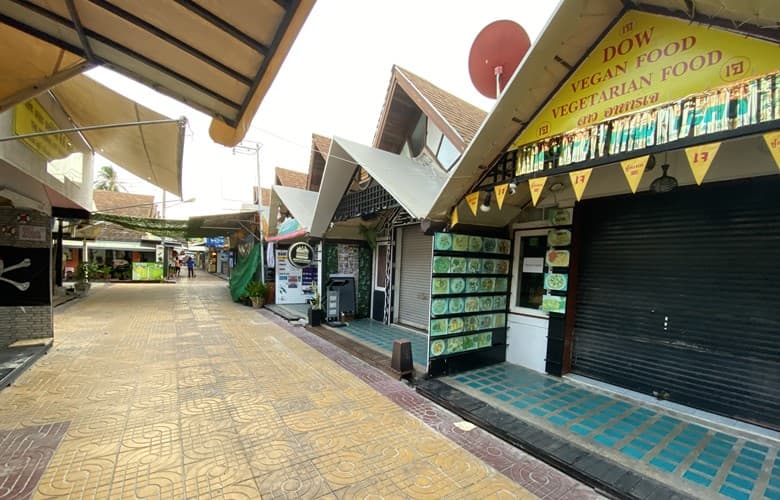
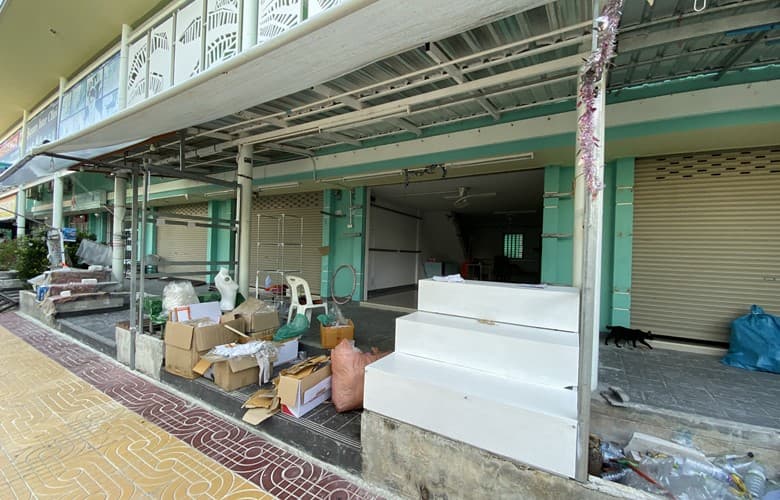
Massage shop owners were flogging the remnants of their shops on the side of the street. Smaller "mom-and-pop" type shops sold their stock in bulk or at a loss, stripped out the fittings and closed down for good. Phone repair shops, restaurants, travel agents, smaller hotels. You name it. Even hospitals closed their doors.
Yes, you're reading that right, hospitals closed. At a time where most of the world's hospitals are overworked, on the island, it was the opposite. There are about five hospitals, and they usually deal with tourists. No drunk tourists mean no patients. All but one of the island's hospitals closed their doors. Now, the hospitals will come back when tourists come back. But smaller business owners aren't so lucky. If I had to guess, I'd estimate in the region of 50% of business on the island will sadly, now be closed down for good.
Find Out More About When Thailand Will Reopen Borders To Tourism After The Coronavirus
What I love about Thailand, or rather, what I love about the Thai people. Is they are genuine, caring, understanding and humble people. In the west we'll greet each other by asking "how are you", and let's be honest, we don't actually care what the answer is. But in Thailand, the Thai people will greet you by asking "Have you eaten yet?".
And when the Thailand coronavirus lockdown came into effect, I got to know some of the local people that I wouldn't have had a chance to otherwise. I'd walk down the street in the mornings and be overwhelmed with the number of people offering a bite to eat with them. It got difficult to even make it to the beach and I'd put on a few extra pounds before I even made it. Seriously, I think, had I really wanted to, I could have survived without having to buy food.
Scrap that, I could have survived without having to buy food- for the entire month April and May meals were generously served up and handed out for free. Two meals a day, for anyone and everyone.
Residents were also given noodles, a literal black sack full. And enough rice to last a lifetime. So I could have got by for two months without having to buy any food at all.
But I still chose to eat out in restaurants buy takeaway food from restaurants. I did so for a couple of reasons, variety for one, but also to support local business. There weren't many restaurants that stayed open, no more than five or six places. But I was grateful there was still places open and I wanted to help out.
Besides the prices dropped to next to nothing, basically, any meal, in any restaurant was 50 Baht, (around one dollar). It was a deal that was too good to pass up on.
I rented a small bungalow next to the beach, a place that would normally rent for $550 a month was dropped to $200 which is an incredible deal. One which I am grateful for, and as all the other bungalows are empty, I am sure the owner is also grateful. It's a win-win-win situation.
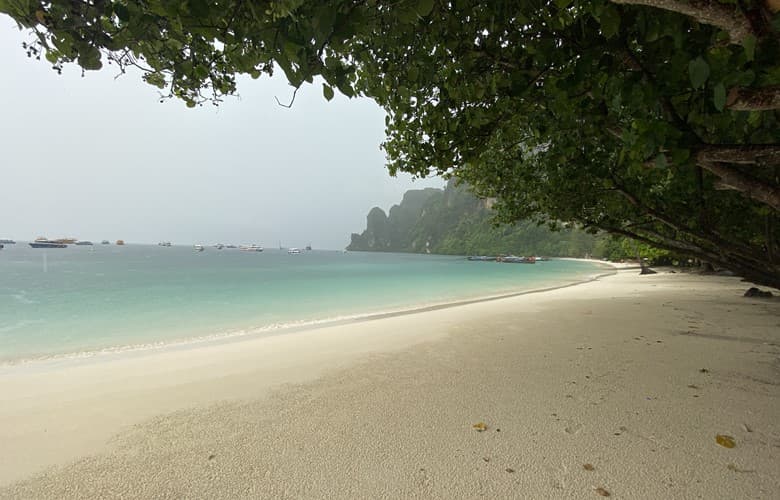
Asides from eating and paying rent there were no other major costs. It's crazy to see how Thailand's most expensive island turned into one of the cheapest.
Find Out More About When Thailand Will Reopen Borders To Tourism After The Coronavirus
The year in Thailand is 2563. Crazy, right? The new year begins mid-April, celebrated with the worlds biggest water party, time off work, street celebrations and a lot of alcohol.
Mass gatherings and mass travel.
Things the government wanted to avoid. For the first time ever "alcohol sales will be prohibited" and "New Years in Canceled" no warnings given, no time for revellers to stock up on booze. A week before and a week after Songkran and alcohol sales were prohibited.
For anyone that's experienced Songkran, it really is unprecedented to have alcohol restrictions put in place. A move that highlighted the severity of the current situation.
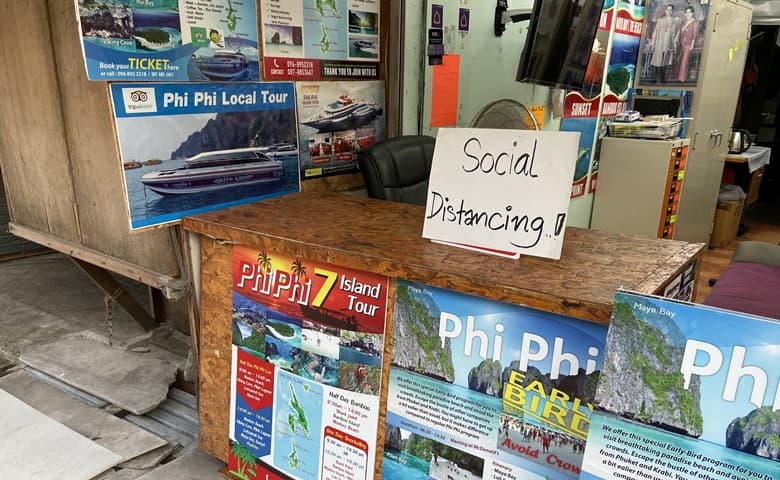
I was a little worried at first when the island became separated from the mainland. How long was the food supply going to last? And more importantly, was there enough alcohol on the island?
Thankfully a delivery boat still arrived each morning. None of the crew would be allowed to disembark. But supermarkets would be able to re-stock with meats and veg.
I never saw beer being unloaded. It didn't take long to figure out why.
Bars, restaurants and stores stock pilled with booze in preparation for what was set to be the busiest month of the year and when tourists stopped coming a surplus remained on the island. There was plenty to go around. Retailers were quick to drop the prices to shift their soon-to-be-expired stock. Three beers for $2 is an offer you can't turn down.
Find Out More About When Thailand Will Reopen Borders To Tourism After The Coronavirus
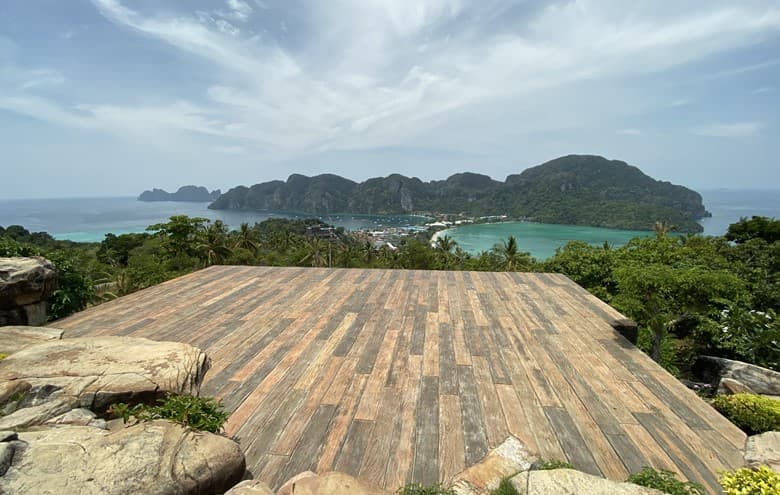
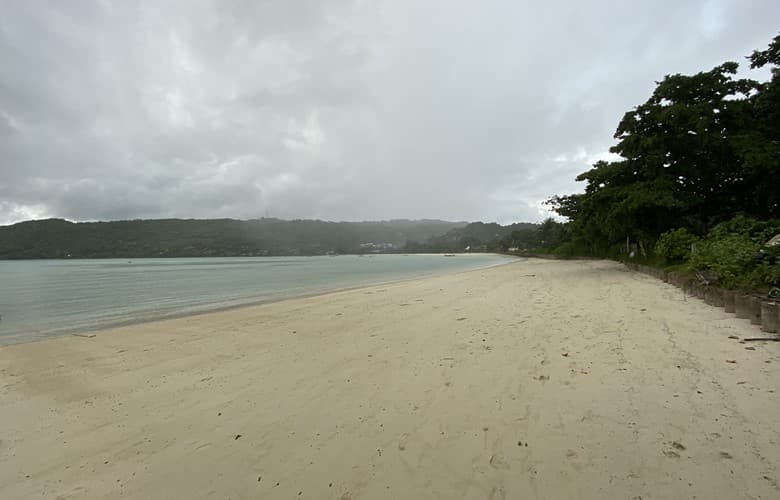
Before the coronavirus hit Thailand. In any tourist destination, you'd be met with the deafening shrieks of the masseuses. "MASSAGE, OK!".
The sounds of boat traffic would pollute the island and music would blast on the beaches all day long. But for once the island was quiet, it was peaceful. It was a nice place to be.
Across Thailand and most of the world, beaches were sealed off to prevent the coronavirus spreading. But here the beaches remained open, some of the most popular beaches in the world were left deserted. It was a beautiful sight to behold.
There would usually be hundreds of boats docked on the sand. But not anymore, the boats were gone. As nice as it was to see the beaches empty, it was also a little frightening. You get the feeling that you really are trapped. There really was no way off the island.
Speedboats which are normally moored in the bay were taken into storage on the mainland and ferries were taken off the island and into storage.
But the thing that strikes me the most is the absence of long-tail boats. The boats are a pinnacle of the island, photos of them are on every postcard and it's what gives the place unique character, its what tourists come to the island for.
But during the coronavirus pandemic in Thailand, work for the boat captains dried up. With no income, there was no reason to stay. 90% of boat owners left the island for their hometowns, sailing home and leaving the beaches deserted. And in all honesty, it was a welcome change. I was able to swim in waters that I never have before. Sections of the beach which were normally closed for boat parking became prime, clear-water swimming spots.
Around the world, incredible environmental changes were showing and it was no different in Thailand. In fact, there have been such positive changes in National Parks that annual closures are being planned, so I guess some positives have come from the coronavirus in Thailand.
Beaches began morphing into a natural state. Before the lockdowns, a layer of suspicions brown sludge covered the on the islands the main beach. It was grim enough to put me off ever swimming there. Over the months the islands been on lockdown that sludge has been gradually growing thinner and slowly starting to disappear. Which is incredible, but on the other hand,it somewhat confirms my suspicions about what it was.
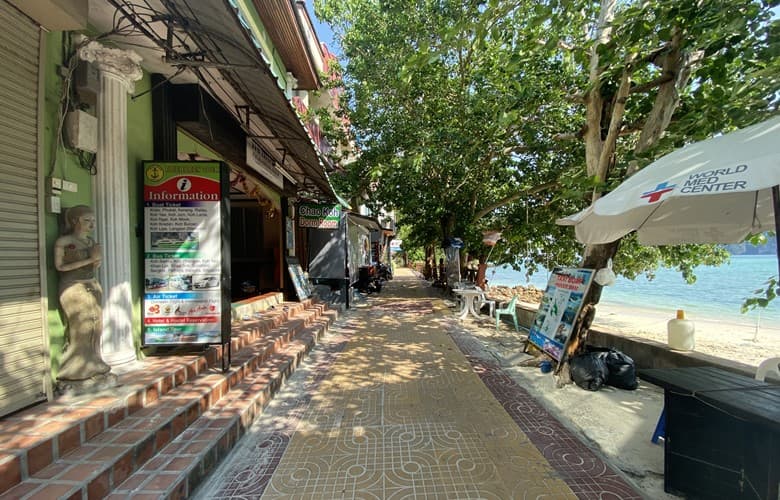
And the water, fuck me, it's stunning. The island actually looks how people make it to seem in those dolled up, edited to the max Instagram posts. There is zero boat traffic to stirring things up, no oil 'accidentally ending up in the water'. I don't even have the words to explain how clear and beautiful the beaches on the island have become over the last few months. Even the photos just don't it justice.
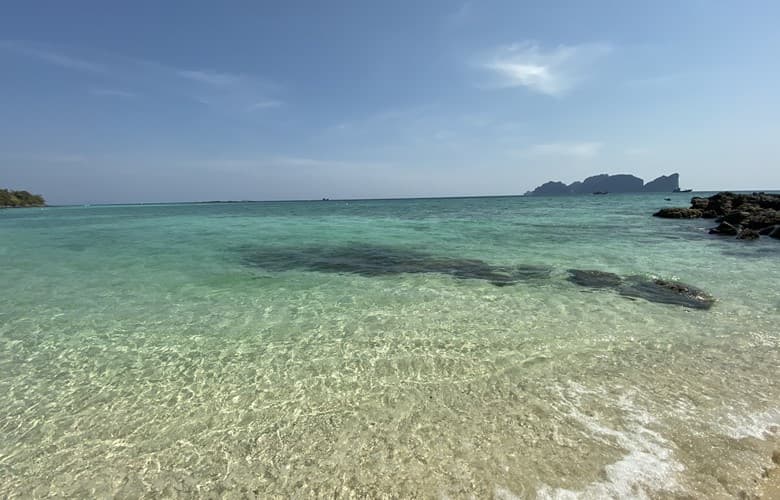
I know many people have gained weight during the coronavirus lockdowns and with so much free food being passed around and cheap beers for sale. It would have been too easy to put on weight. Luckily I had all the hiking trails to myself, in the peak of the mountains a look-out point which is usually packed with tourists became a spot I could enjoy all to myself.
In a way, I want the island to remain free from tourists. It's freaking beautiful. It's how tourists expect the island to look. But on the other hand, it can't stay like this. I've seen first-hand business go under and locals left financially devastated by the virus. Almost 100% of the population lost their entire incomes within a matter of days.
And, if I'm being perfectly honest, without tourists here, it just ins't as fun.
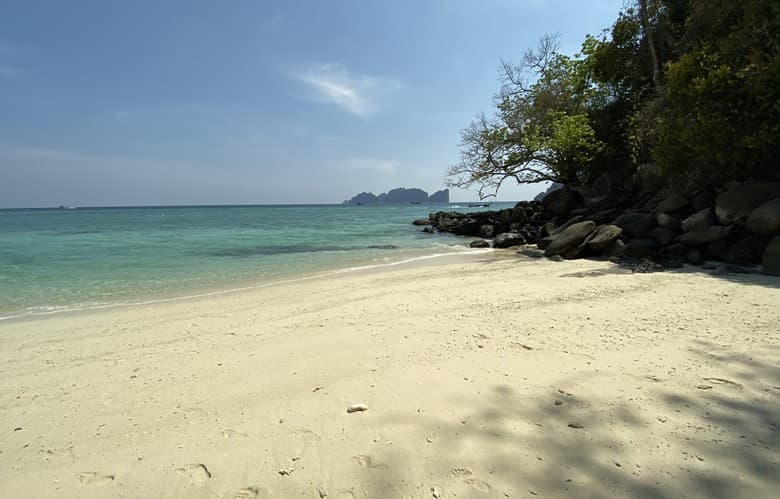
I never thought I'd find myself saying this, but the island is boring without tourists. Yes, nature is incredible but there is only so much time you can spend on deserted beaches and hiking trails.
The number one complaint I hear is. "There are too many tourists here".
Tourists love to complain about other tourists being here. They would claim that too many people took away from the islands natural beauty. Countless travel bloggers and travellers have claimed the island has been destroyed by tourism and it isn't worth visiting.
Things have changed and it's never going to go back to how it was in the 90s'. The island is an established tourism destination, with hotels and facilities to accommodate travellers. In reality, we need to embrace these changes and see it as a positive. Peoplethinkthey want a deserted island, and they complain when they find out that isn't what they're getting. Until the coronavirus hit Thailand, I would have totally agreed.
But after seeing this place first hand without tourists it has given me a completely new outlook on things. It's boring. The nightlife is what gives the island its soul. Admittedly, it's not going to be to everyone's liking, and that's ok. There are plenty of the Andaman Islands that are quiet where you can get away from it all. But that's not what it is about here, the things that people complain about, the craziness, the drunken backpackers and the sheer number of tourists congregating on such a small island is what gives the island character and charm, it is what brings people together. And without it, Phi Phi is just another pretty island, with nothing special about it. Without tourists the island is nothing.
Let's hope that travel can resume in the near future and we can all start piecing our lives back together.
Find Out More About When Thailand Will Reopen Borders To Tourism After The Coronavirus
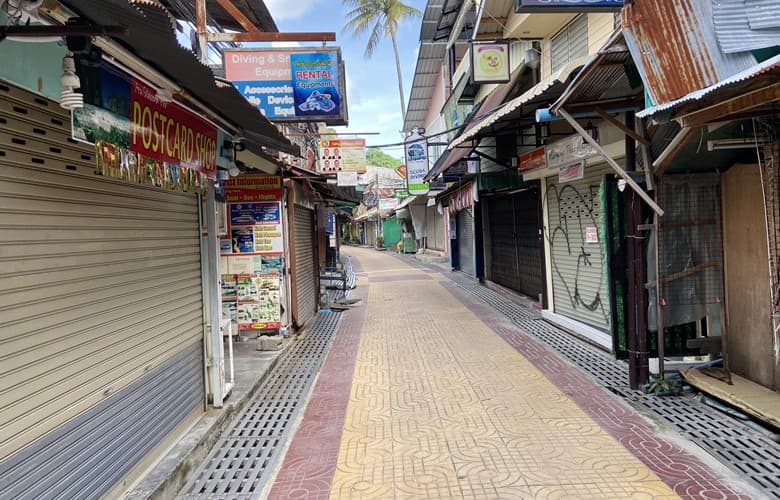
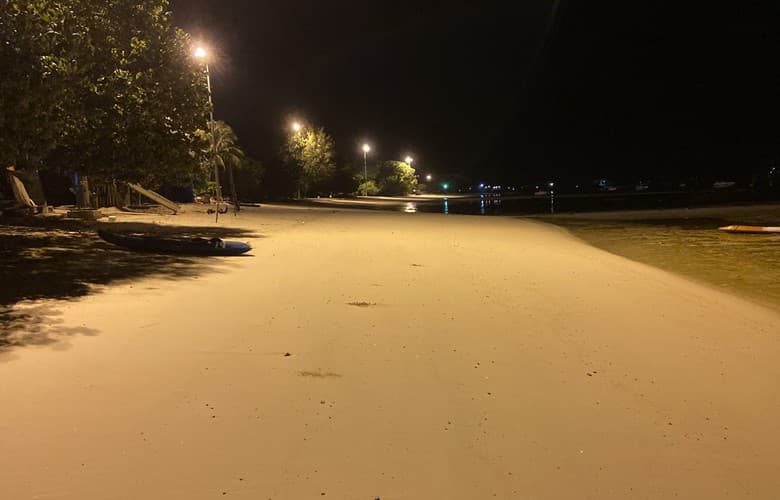
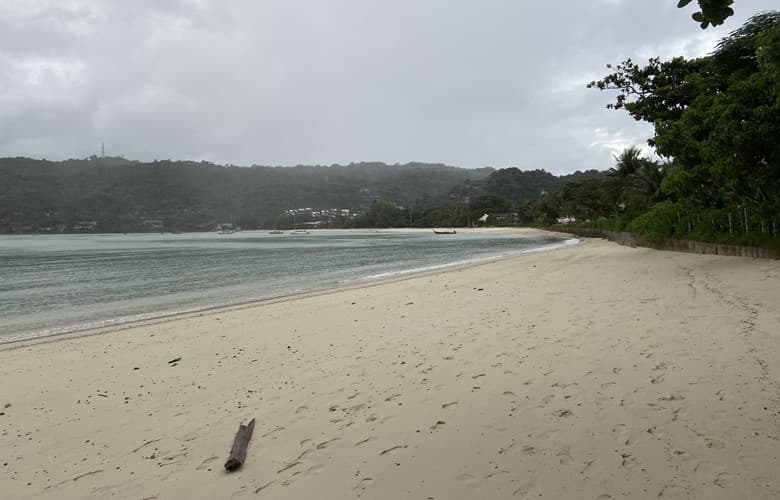
Robb, who finds it a little unusual to write about himself in the third person, has been living in Southeast Asia for over 10 years. He works online and is based in Bangkok, Thailand. During this time, he has had the chance to travel extensively throughout this beautiful region.
2 Comments
Thanks for a great read and insight into life in quarantine on Phi Phi. I´ve been there many times myself, first in 1996 and last in 2007 (I lived in Phuket for a number of years teaching Scuba diving) and I have seen the islands transform and evolve into mass-tourism destinations, for better or for worse. According to Friedman's "shock-doctrine", crises like this present wonderful opportunities to make things worse for the common man. Up until the 2004 Tsunami, while busy, Phi Phi still had a relatively chill vibe with mostly guesthouses and low-rising hotels. After the Tsunami washed all of that away, developers saw opportunity to cram in as much square footage of heartless hotel rooms as possible. I agree with you, however, that without anyone there it's got to be boring as hell after a few days. I guess the sweet spot lies there somewhere in the middle. Anyways, I´m new to your blog and I look forward to delving into it as you have a great style and an authentic feel. Keep up the good work! David
Thanks for a great read and insight into life in quarantine on Phi Phi. I´ve been there many times myself, first in 1996 and last in 2007 (I lived in Phuket for a number of years teaching Scuba diving) and I have seen the islands transform and evolve into mass-tourism destinations, for better or for worse. According to Friedman's "shock-doctrine", crises like this present wonderful opportunities to make things worse for the common man. Up until the 2004 Tsunami, while busy, Phi Phi still had a relatively chill vibe with mostly guesthouses and low-rising hotels. After the Tsunami washed all of that away, developers saw opportunity to cram in as much square footage of heartless hotel rooms as possible. I agree with you, however, that without anyone there it's got to be boring as hell after a few days. I guess the sweet spot lies there somewhere in the middle. In any case, I´m new to your blog and I look forward to delving into it and your easy-going and authentic style. Keep up the good work! David (from Iceland)
Leave a Comment